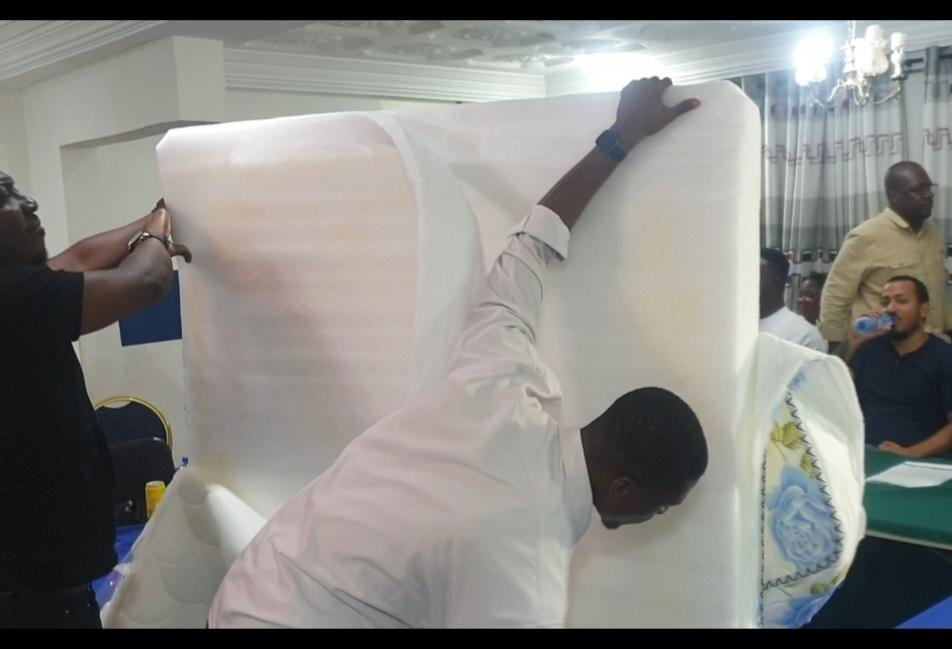News
COVID-19: Ghanaians reduce trips to short distances—Report

A latest report on mobility among the Ghanaian population has established a decrease in travels following the lifting of the two-week partial lockdown imposed in parts of the country to contain spread of the coronavirus (COVID-19).
Assessing movements within regions and districts in hitherto restricted areas like the Greater Accra Region and Kumasi in the Ashanti Region as well as other areas around the country, the report found that though movements had slightly increased, it remains lower than the norm.
Generally, it noted that trips were mainly restricted to short distances and routine daily trips related to activities such as commuting to work, shopping and entertainment.
Jointly conducted by the Ghana Statistical Service (GSS), Flowminder Foundation, a non-profit organisation and Vodafone Ghana, the report used data from mobile network operators to understand mobility patterns of the citizenry for decision making in managing the pandemic.
The organisations analysed the effects of mobility and social distancing interventions between February 17 and May 3, 2020, highlighting the differences in population movements before, during and after the mobility restrictions were introduced and lifted.
Government Statistician, Professor Samuel Annim, in a release copied to the Ghanaian Times yesterday, commended the public for showing discipline after the lockdown and not reverting to old ways of living.
“The observation that mobility after the partial lockdown was lifted remains at levels lower than mobility during the periods of the baseline and the initial restrictions, including sanctioning social distancing and adherence to public health hygienic protocols, endorses the effectiveness of the use of moral suasion as a complementary intervention in the fight against COVID-19.
“Residents in Ghana deserve commendation for not reverting to the ways of living prior to the imposition of the initial restrictions and are therefore urged to continue with change in behaviour in order to contain the epidemic,” he said.
Prof. Annim was confident the report will support policy making and decisions in government response to the pandemic moving forward.
Chief Executive Officer (CEO) of Vodafone Ghana, Patricia Obo-Nai, noted that mobility insights was crucial in evaluating the effectiveness of measures put in place by government in fighting COVID-19.
She, thus, hoped that more research is focused in the area to support policy making.
On her part, Data Scientist at Flowminder, Tracey Li, observed that the overall trend in reduction of movement could be helpful in case management and treatment of COVID-19 cases.
As of yesterday, Ghana had a total of 5,735 confirmed cases of COVID-19 with 1,754 recoveries and 29 deaths.
Of the number tested positive to the virus, 3,906 had come from contact tracing; 1,714 from routine surveillance and 115 from mandatory quarantine, meaning that contact tracing, was helping discover more infected persons in the country.
BY ABIGAIL ANNOH
News
Watch your mattresses!…they can cause chronic back pain, other health disorders

Local mattress manufacturers have raised serious concerns over the influx of substandard mattresses, warning that these products pose significant health risks to consumers and threaten the sustainability of Ghana’s mattress industry.
At a press briefing held in Kumasi on Tuesday, manufacturers accused unregistered foreign entities, particularly Chinese firms, of flooding the market with cheap mattresses made from polystyrene.
Mr Yaw Ampem Darko, a spokesperson for the local manufacturers, warned that prolonged use of substandard mattresses, especially those made with polystyrene, could result in chronic back pain, musculoskeletal disorders, poor posture, and diminished sleep quality.
These health implications, they stressed, were not always immediately evident but accumulate over time, especially among vulnerable populations such as children and the elderly.
This material, typically used for packaging, is considered unsuitable and unsafe for bedding.
According to industry leaders, these sub-standard products have been circulating for at least five years, gaining traction among unsuspecting consumers due to their unusually low prices.
“These mattresses are being sold at suspiciously low prices, luring unsuspecting consumers who are unaware of the health dangers.”
“We are not just protecting our businesses; we are protecting Ghanaian lives. The government must act swiftly to stem this tide before more citizens fall victim to these dangerous products,” Mr Yaw Ampem Darko stated.
The Ghana Standards Authority (GSA) has acknowledged the issue and, in response, announced a nationwide enforcement campaign aimed at clamping down on the production, distribution, and sale of substandard mattresses.
The campaign, which was scheduled to take effect from September 30, 2025, was empowered by the GSA Act, 2022 (Act 1078), which authorises the Authority to seize and seal non-compliant products and impose sanctions on offenders.
In a statement signed by the Director General of the GSA, Professor George Agyei, the authority cited Sections 29 and 43 of the Act, reiterating that all mattresses sold in Ghana must meet established national standards or face confiscation.
The statement further emphasised that mattresses failing to meet these standards not only compromise sleep quality but also contribute to long-term health complications, including spinal and neck pain.
Despite the GSA’s commitment, manufacturers have expressed frustration over delays in implementation and called for stronger enforcement mechanisms.
They urged the GSA to work in close collaboration with the Customs Division of the Ghana Revenue Authority and national law enforcement agencies to identify and prosecute violators of Ghana’s quality standards.
Manufacturers are also appealing to consumers to remain vigilant and prioritise their health by verifying that any mattress they purchase bears the GSA certification mark.
Moreover, they caution the public against purchasing suspiciously cheap mattresses that lack proper labelling or identifiable branding, as these were often indicators of substandard or counterfeit products.
As the official enforcement deadline had expired with no show, the local producers insisted that much more than business interests were at stake.
They argued that without swift and sustained action, the health and safety of Ghanaian consumers would continue to be compromised.
“Public awareness, strict enforcement, and collaboration among regulatory bodies are essential if we are to protect the integrity of the local industry and the wellbeing of the Ghanaian people,” Mr Darko indicated.
From Kingsley E. Hope, Kumasi
Join our WhatsApp Channel now!
https://whatsapp.com/channel/0029VbBElzjInlqHhl1aTU27
News
Raissa Initiative demands harsher punishment for sexual abusers of girls

The Founder of the Raissa Child Protection Initiative, Ms Raissa Sambou, has urged authorities to impose severe punishment on individuals, including teachers and guardians, who sexually abuse young girls.
Speaking in an interview to mark this year’s International Day of the Girl Child (October 11), Ms Sambou condemned the increasing cases of sexual exploitation involving minors, describing such acts as “heartless, criminal, and a total betrayal of trust.”
She noted that those entrusted with the care and education of children must not be the same people who violate them, stressing that “anyone found guilty of abusing a girl child must face the full rigours of the law without leniency.”
The International Day of the Girl Child is observed annually to promote the rights of girls, empower them to reach their full potential, and draw attention to the challenges they face worldwide.
Ms Sambou lamented that poverty continues to push many young girls into vulnerable situations, exposing them to exploitation.
She expressed concern that some headmasters, teachers, and community members who should protect girls rather take advantage of them.
“This must stop immediately. The safety of every girl must never be compromised,” she said, urging the public to report all forms of abuse to the appropriate authorities and called for swift action by law enforcement agencies against perpetrators.
Addressing girls directly, Ms Sambou encouraged them to take their education seriously and to believe in their potential.
“It is possible to be young and responsible. Your future is bright, protect it, believe in it, and never let anyone dim your light,” she advised.
She further urged girls to choose their friends wisely, stay disciplined, and speak up if anyone makes sexual advances toward them.
Ms Sambou concluded with a rallying call for collective action, saying “speak up, protect them, and empower them. Together, we can end the sexual exploitation of girls.”
By Esinam Jemima Kuatsinu
Join our WhatsApp Channel now!
https://whatsapp.com/channel/0029VbBElzjInlqHhl1aTU27






